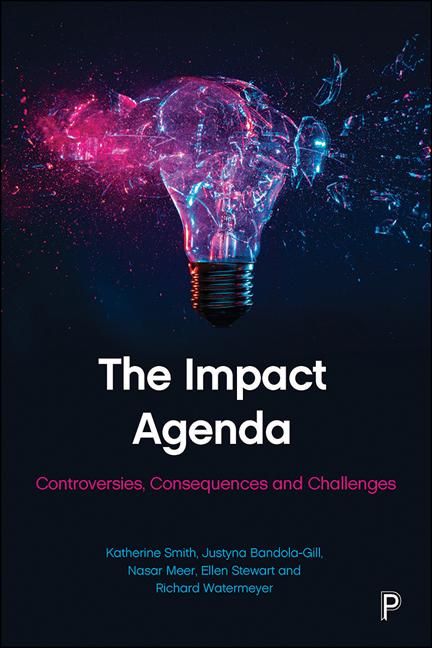Book contents
- Frontmatter
- Contents
- List of figures, tables and boxes
- List of abbreviations
- Notes on authors
- Acknowledgements
- 1 Introduction: Critical Reflections on Research Impact
- 2 The Rise of Research Impact
- 3 Debating the UK Impact Agenda
- 4 Do Experiences and Perceptions of Research Impact Vary by Discipline?
- 5 Impact on whom? Contrasting Research Impact with Public Engagement
- 6 Public Intellectualism and the Impact Agenda: International Perspectives
- 7 Academic Life in the Impact Vanguard: The View from Knowledge Exchange Organisations
- 8 Looking Back: Evolving Public Health Perspectives on Research Impact
- 9 Telling Tales of Impact: As Seen Through the Eyes of User Assessors
- 10 Conclusion: What Would an Evidence-Informed Impact Agenda Involve?
- References
- Index
7 - Academic Life in the Impact Vanguard: The View from Knowledge Exchange Organisations
Published online by Cambridge University Press: 23 February 2021
- Frontmatter
- Contents
- List of figures, tables and boxes
- List of abbreviations
- Notes on authors
- Acknowledgements
- 1 Introduction: Critical Reflections on Research Impact
- 2 The Rise of Research Impact
- 3 Debating the UK Impact Agenda
- 4 Do Experiences and Perceptions of Research Impact Vary by Discipline?
- 5 Impact on whom? Contrasting Research Impact with Public Engagement
- 6 Public Intellectualism and the Impact Agenda: International Perspectives
- 7 Academic Life in the Impact Vanguard: The View from Knowledge Exchange Organisations
- 8 Looking Back: Evolving Public Health Perspectives on Research Impact
- 9 Telling Tales of Impact: As Seen Through the Eyes of User Assessors
- 10 Conclusion: What Would an Evidence-Informed Impact Agenda Involve?
- References
- Index
Summary
As we have seen, there appears to be a basic assumption within the UK's approach to research impact (see Chapters 1, 2 and 3) that the incentives for the engagement between researchers and research users lead to an increase in research impact. Consequently, recent decades have witnessed the expansion of funding initiatives aimed at supporting and incentivising knowledge translation. One of the key UK research council strategies to address concerns about research utility and impact has been to fund knowledge broker initiatives aimed at bridging the gap between research and application and increasing engagement between academic and non-academic audiences. These organisations and posts are predominantly located at universities and have employed mainly academics, although their remit goes beyond what would traditionally be considered academic work and includes developing practices aimed at supporting evidence-based policy and practice.
This approach to increasing evidence uptake in policy and practice is, at least to a degree, reflected in the recommendations from research use literature (see Choi, 2005; Oliver et al, 2014; Cairney and Oliver, 2018). This strand of scholarship argues that one of the barriers to research uptake is the academic epistemic culture, which incentivises research that is decontextualised, theoretical and not necessarily relevant to practical problems (D’Este et al, 2018). From this perspective, the impact agenda might be viewed as offering a crucial opportunity to diminish key barriers to research use by promoting the activities that help ensure there is less of a gap between user preferences and research practices; in effect, promoting new priorities, incentives and values in UK academia. How the impact agenda is actually being experienced by those at the ‘vanguard’ of these changes is, however, underexplored.
In this chapter, we start to explore this gap by focusing on academics working in two specially designated and funded university-based knowledge exchange organisations that were focusing on policy and practice audiences (see Chapter 1 for a more detailed overview of the research data). These organisations have both been involved in work to promote knowledge exchange and achieve research impact for over a decade. We view these organisations as positioned at the forefront of the wider changes that the impact agenda is encouraging across academic institutions in the UK.
- Type
- Chapter
- Information
- The Impact AgendaControversies, Consequences and Challenges, pp. 137 - 160Publisher: Bristol University PressPrint publication year: 2020



